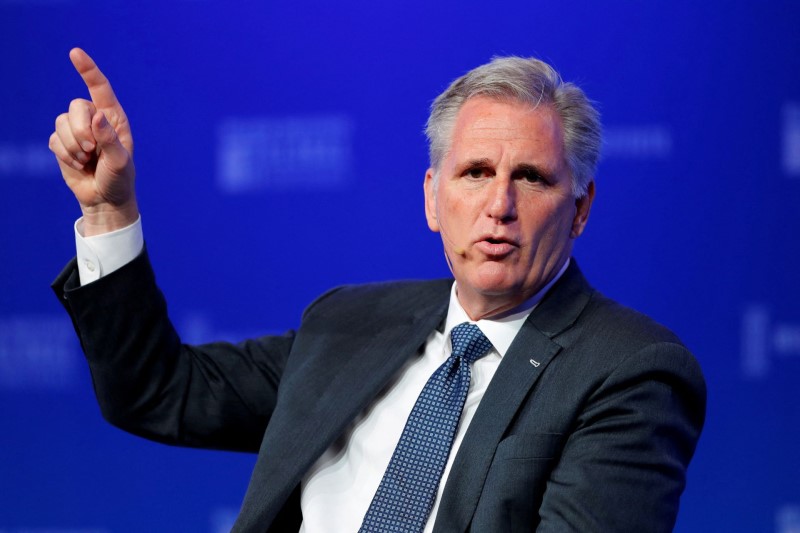(Bloomberg) -- House Speaker Kevin McCarthy told a Wall Street audience on Monday that the US House will vote in coming weeks on a plan to lift the nation’s borrowing limit, but not without new curbs on spending.
“Defaulting on our debt is not an option,” McCarthy said in a speech to executives at the New York Stock Exchange. But “a no string-attached debt limit increase will not pass.”
The setting for McCarthy’s speech — a jam-packed board room in the hub of the Financial District of Lower Manhattan — was selected to reassure markets and anxious financial players the GOP is taking the negotiations seriously, even if also reasserting that curbing the nation’s spending must be part of the mix.
The California Republican accused President Joe Biden of ignoring the problem and refusing to negotiate in good faith by rejected any deal on the debt limit.
McCarthy and Biden met Feb. 1 to discuss the limit but have been at a stalemate since then, with each demanding the other make the next move. McCarthy on Monday again called on Biden to meet to discuss the issue.
Republicans have yet to offer a budget plan that would layout specifics of where the spending cuts would fall, which Biden has called on them to do. White House Deputy Press Secretary Andrew Bates, in a statement, accused McCarthy and the GOP of “holding the full faith and credit of the United States hostage.”
The US is approaching its $31.4 trillion debt limit, which must be raised by sometime this summer to avoid a market-rattling US payment default. That would push up borrowing costs for everything from mortgages and credit card balances to auto loans.
Financial markets so far are showing little sign of concern that Congress and the White House won’t be able to reach a deal. Standoffs over the debt limit aren’t new. The closest the US has ever come to a payments default was in 2011, when a debt catastrophe was averted by a matter of days. That led to the first-ever downgrade of the US sovereign debt rating by Standard & Poor’s.
McCarthy and House Republicans have drawn up a wish list of spending cuts, along with limits on future spending, in exchange for suspending the debt ceiling for a year — which would put the next big showdown right in the middle of the 2024 campaign for Congress and the White House.
Under McCarthy’s plan discretionary spending would have to be cut $130 billion to fiscal year 2022 and then grow 1% per year over 10 years. Work requirements in anti-poverty programs would be toughened for able-bodied adults without dependents and unspent Covid funds would clawed back. The GOP is planning to demand energy permits be eased as part of the deal.
It remains unclear when text of McCarthy’s GOP plan will be unveiled, though people familiar with the process said plans are to do that this week.
The bill the GOP has prepared is far from being a likely resolution, But it could form an opening marker for future budget talks and an end the debt-limit standoff that is threatening a US payments default.
The speaker has very little room to maneuver with a scant nine-seat House majority, one that is hardly unified. In addition, any plan that get through the House also would have to pass in the Senate, which is under Democratic control.
“The problem gets solved only when both parties work together,” McCarthy said. “Had the president agreed to negotiate in good faith we’d already be done.”
McCarthy sought to lay all the blame for the stalemate on Biden and accused him of ignoring the risks being posed by inflation and the looming debt ceiling deadline.
“I do not want to see this president bumble into a default,” he said.
Democrats responded by putting onus on House Republicans. Top Budget Committee Democrat Brendan Boyle said the GOP is “in chaos” and that McCarthy’s proposal “was nothing more than a recitation of the same bad ideas and devastating cuts” that Republicans have been offering for decades.
